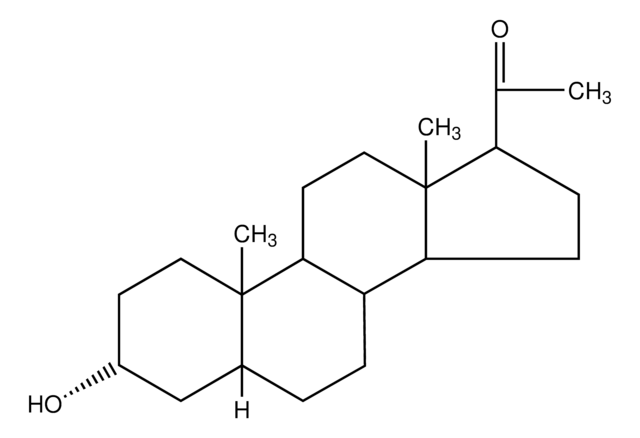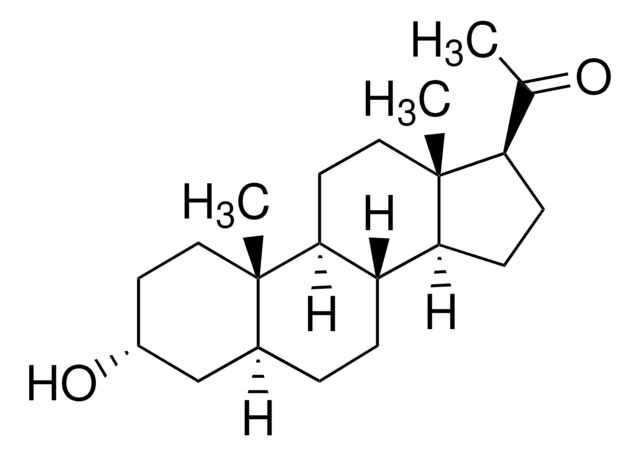P2016
3α,21-Dihydroxy-5α-pregnan-20-one
≥95%
Synonyme(s) :
21-Hydroxyallopregnanolone, 5α-Pregnane-3α,21-diol-20-one, 5α-THDOC, Allopregnane-3α,21-diol-20-one, Allotetrahydrodeoxycorticosterone
About This Item
Produits recommandés
Niveau de qualité
Pureté
≥95%
Forme
powder
Chaîne SMILES
[H][C@@]12CC[C@@]3([H])[C@]4([H])CC[C@H](C(=O)CO)[C@@]4(C)CC[C@]3([H])[C@@]1(C)CC[C@@H](O)C2
InChI
1S/C21H34O3/c1-20-9-7-14(23)11-13(20)3-4-15-16-5-6-18(19(24)12-22)21(16,2)10-8-17(15)20/h13-18,22-23H,3-12H2,1-2H3/t13-,14+,15-,16-,17-,18+,20-,21-/m0/s1
Clé InChI
CYKYBWRSLLXBOW-GDYGHMJCSA-N
Informations sur le gène
human ... GABRA1(2554) , GABRA2(2555) , GABRA3(2556) , GABRA4(2557) , GABRA5(2558) , GABRA6(2559) , GABRB1(2560) , GABRB2(2561) , GABRB3(2562)
rat ... Gabra2(29706)
Description générale
Application
- as an γ-aminobutyric acid type A receptor (γ-GABAA) agonist in voltage-clamp measurements studies in Xenopus oocytes
- to test its effect on the spike-wave discharges (SWD) finasteride-treated rats
- in electrophysiological studies with dentate granule cells (DGCs) post controlled cortical impact (CCI) -induced brain injury
Actions biochimiques/physiologiques
Caractéristiques et avantages
Code de la classe de stockage
11 - Combustible Solids
Classe de danger pour l'eau (WGK)
WGK 3
Point d'éclair (°F)
Not applicable
Point d'éclair (°C)
Not applicable
Équipement de protection individuelle
Eyeshields, Gloves, type N95 (US)
Certificats d'analyse (COA)
Recherchez un Certificats d'analyse (COA) en saisissant le numéro de lot du produit. Les numéros de lot figurent sur l'étiquette du produit après les mots "Lot" ou "Batch".
Déjà en possession de ce produit ?
Retrouvez la documentation relative aux produits que vous avez récemment achetés dans la Bibliothèque de documents.
Articles
DISCOVER Bioactive Small Molecules for Neuroscience
DISCOVER Bioactive Small Molecules for Neuroscience
DISCOVER Bioactive Small Molecules for Neuroscience
DISCOVER Bioactive Small Molecules for Neuroscience
Notre équipe de scientifiques dispose d'une expérience dans tous les secteurs de la recherche, notamment en sciences de la vie, science des matériaux, synthèse chimique, chromatographie, analyse et dans de nombreux autres domaines..
Contacter notre Service technique






